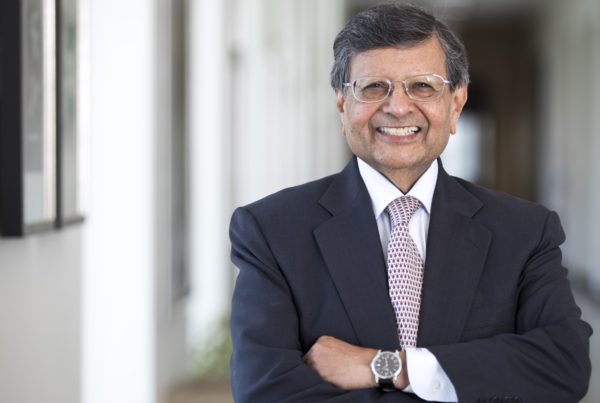Published: Oct 06, 2005 in Knowledge@Emory
After months of public struggle against Morgan Stanley’s most powerful investment bankers, CEO Phillip Purcell surrendered July 15 by announcing his retirement. At the end of June, the board tapped his predecessor, John Mack, to return to the top spot.
Although the return of Mack may be the last act in this spring’s public drama at the New York-based financial services giant, professors at Emory University’s Goizueta Business School and other banking and business organization experts say it’s likely to be just the beginning of a long struggle if the firm is to regain its spot as one of Wall Street’s preeminent firms.
Such challenges to the $58 billion corporation include the ongoing cultural conflict between the company’s investment bankers and its retail brokers, the strategic question of what to do about some of its under-performing assets such as its Discover credit card business, and the organizational and political issues raised by the way Mack regained his power at Morgan Stanley.
Perhaps the most pervasive issue is the cultural clash between the firm’s investment banking elite and the large retail brokerage segment that used to be Dean Witter. Some analysts say that Purcell, who was formerly CEO of Dean Witter before the 1998 merger, failed in part because he never gained the respect of the investment bankers.
“Purcell was a very adroit, very savvy guy who managed to win in the bureaucratic sense but I think he lost in the leadership sense,” says Christopher Whalen, managing director of Institutional Risk Analytics, a financial research service based in Croton-on-Hudson, NY. “In other words, he didn’t have the fear and respect of the bankers.”
Mack, with his nearly 30 years of service at Morgan Stanley, should be able to win that trust in a way that Purcell could not, notes Joel M. Koblentz, a senior partner at executive search firm Morgan Howard Worldwide with extensive experience in executive and board searches. “If you’re asking people to be creative, coming up with solutions that can be marketable and therefore valuable to the firm and its shareholders and they’re frightened to take those steps, they’re not going to take them. I think what he brings to the troops is a feeling of comfort to apply ingenuity,” notes Koblentz, who is also a member of the Goizueta Business School Advisory Board.
So the bankers may be happier, but what about the other side of the firm, the retail stockbrokers? Can they learn to coexist?
The answer may well be no. After seven years, the brokerage division and the banking division still seem to function as very separate entities.
Nicholas Valerio, a professor of finance, says he is unsure whether the groups can coexist. However, he adds that many Wall Street firms have had to cope with such cultural differences and somehow thrived in spite of it. “Those culture clashes have existed on Wall Street for a long time, even in the beginning when these firms started diversifying their business model away from just the traditional investment banking,” he says. Goldman Sachs, for example, operates many different businesses but they have managed to create a cohesive culture in spite of it.
But finding ways to make the brokerage side of the business feel that it’s part of one big happy family may not be a priority right now for the man Wall Street likes to call “Mack the Knife.” On July 29, Morgan Stanley announced that Mack intended to cut roughly 1000 brokers or 10% of the firm’s retail brokerage work force – a move that some analysts interpreted as a possible first step toward putting the brokerage unit up for sale, because cutting low performers tends to plump a brokerage firm’s profitability ratios.
If the brokerage unit ends up on the block, it would mark an ironic close to Morgan Stanley’s career as a “one stop shop” for financial services: Mack engineered the 1998 merger with Dean Witter, the deal that eventually ended his long career at Morgan Stanley, and left Purcell in charge of the new firm.
Although the stock of the firm has performed far lower than its peers for most of the past five years, Whalen believes a major deal right now would be a mistake. He argues that the best course at the present would be to take no action beyond trying to get the company to function better. “I think if Mack is smart, he’s going to let the dust settle and just run the business,” he says.
Jadgish Sheth, a professor of marketing and corporate strategist, also believes Mack shouldn’t focus too much on shareholder priorities. “He has to go beyond strictly worrying about shareholders,” observes Sheth. Instead, he says Mack must consider three stakeholders – the shareholders, the clients, and the employees. Satisfying all three is the only way a CEO succeeds in the long term, he argues. “Anyone who leans toward one stakeholder at the expense of the other two usually has a short-term gain and a long-term disaster,” he says.
The one short-term gift to shareholders Sheth would offer is selling the Discover Card business, which remains one of the country’s weaker credit card brands seven years after it was acquired with Dean Witter. Some observers have argued that ownership of the card is a good thing because it provides a steadier source of cash than the notoriously cyclical investment banking and financial services businesses. Sheth, however, doesn’t see it that way. He says the only question to ask about Discover is: “How do you sell it as fast as possible?”
On the client side, Sheth says that Mack needs to work on the brand. “The brand needs to be re-energized again because the brand is tarnished now and in a professional services business, it’s all about trust.”
Reenergizing the brand is not a matter of buying some ads, notes Sheth. Instead, it’s about delivering on promises to clients. “You cannot buy a brand in the marketplace nor can you manufacture it in a factory. You have to earn it,” he says.
Clients need to be reassured that the firm is going to be more stable from here on out. Companies aren’t going to want to trust such life-and-jobs issues as mergers to a firm unless they are sure that they have the full attention of those professionals, Sheth says.
As for employees, Sheth argues that the core value of a professional services firm such as Morgan Stanley is not clients or its investments but knowing how to attract the right talent.
On the retail side, raising morale and attracting better employees by firing 10% of the workforce would seem to be a questionable proposition – but that may not be part of the plan if the unit is for sale. However, on the investment banking side, most analysts say that Mack, who spent 29 years at Morgan Stanley before leaving after the merger, should have a good chance of luring back some of the high-profile bankers whose well-publicized defections helped bring Purcell down. Already, Mack is tapping individuals he’s worked with before at Morgan Stanley or, in the case of Gary Lynch and Eileen Murray, former executives from his last post as CEO at Credit Suisse First Boston.
But Sheth argues that such short-term moves are only the beginning. Once short-term conditions at the company stabilize, he says, the firm must focus on employees. “Attracting the next generation of talent and retaining them would be the key issue,” observes Sheth.
Another issue facing both Mack and his company has to do with the short-comings in the firm’s governance exposed by the way Purcell was removed from the executive suite and the way Mack arrived, according to professors and other experts.
One concern: some observers note that those senior employees who played a role in toppling Purcell may have an outsize voice regarding how the firm is run going forward.
Peter Topping, executive director of executive education and senior lecturer in organization and management at Goizueta, says the fact that the pressure for Purcell to depart was generated largely by a group of highly vocal senior investment bankers—the so-called “Group of Eight”—is likely to have ramifications for the company down the line. “There are always repercussions of a mutiny,” he says.
Exactly what those repercussions will be is unclear, Topping says. One reason may be that there are so few case examples: “There are lots of examples of boards pushing people out. It’s hard to find public examples where direct reports push a leader out,” he says.
While Machiavelli might have advised Mack to fire the eight immediately to prevent their gaining more power or doing the same thing against him at some point, Sheth argues that it’s worth managing the group because of their value to the firm.
“It’s a talent issue,” Sheth explains. “You have to manage these people. It’s easy to fire them but then that’s not going to be the solution.”
Yet ignoring the possible fallout may not be the right move either. The shift from Purcell to Mack is “more than just a change of individual leadership,” Topping warns. “It’s also a cultural issue, an organizational issue when something like this happens. It’s a realignment and an adjustment of power. And that always has, again, some repercussions. It will take a while before we begin to see them. So which units become more dominant? Does this group of mutineers remain intact or will the new leader dig into them?” he asks. Does this change the balance of power between the company’s central executive team and its local and regional businesses?
“All this can play out over years and we just won’t know until it starts to happen,” Topping says. The new leader “has some interesting challenges ahead of him.”
One issue that apparently won’t be addressed is the firm’s highly centralized power structure, which allowed Purcell to remain at his post for the past five years in spite of the firm’s largely dismal stock performance relative to other finance companies.
Some foreign analysts have suggested splitting the president and CEO roles into two distinct jobs as they are in Great Britain as a way for the company to ease out underperforming executives more easily in the future. But Sheth is skeptical that the idea could succeed here. “It’s an old British system. It’s not going to work in America,” he says. In U.S. corporations, he says, people prefer strong leaders.
While the replacement of CEOs might suggest that the company is now going to be more responsive to its shareholders’ interests in the future, some analysts have suggested that Mack’s compensation package is evidence that the company still hasn’t learned its lesson.
Executive compensation specialist Graef Crystal, in a recent column for Bloomberg News, estimated that Mack’s pay package over the next year and a half is worth a minimum of $76 million, as long as the stock price stays at least even and the average compensation for four other major Wall Street chiefs the package is pegged to doesn’t sink. In a scathing critique of Mack and what he called Morgan Stanley’s “spineless” compensation committee, Crystal wrote that “For John Mack to demand or accept the compensation contract he just received from Morgan Stanley for being named chairman and chief executive shows that he isn’t the right man for the job— if that job is keeping shareholders’ interests in mind.”
If Mack is indeed motivated by filthy lucre rather than a desire to restore the firm to its former glory, the firm’s namesake, J.P. Morgan, would probably not have been too surprised. “A man always has two reasons for doing anything: a good reason and the real reason,” the astute financier once noted.




